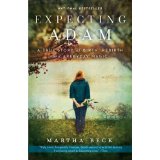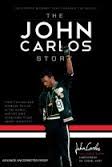Expecting Adam: A True Story of Birth, Rebirth and Everyday Magic
Martha Nibley Beck
Three Rivers Press NY,NY 1999, 2011
ISBN:978-0-307-71964-5
This is a memoir. At the time they were expecting Adam the couple were both PhD candidates at Harvard University. She finds out early on that he will be born with Down’s Syndrome. Martha Beck writes this memoir ten years later with much help from her old journals, diaries and conversations with friends and family. The narrative is centered at the time of her pregnancy with Adam. She occasionally jumps through time offering an incident in Adams life that underscores her experience.
I find this an interesting story juxtaposed to The Fault in Our Stars. There the author insists that he is writing fiction but his work rings true. Here the author insists she is writing truth but her story doesn’t sit well with me. It is the fantastical and spiritual parts of the story that I believe and the truth of the tale that I do not. I find her jumps in time between being pregnant and having a 10 year old son at the time she’s writing disconcerting. That she occasionally tosses in a scene with her son at 2 or 5 or 7 doesn’t help continuity. I see what she’s trying to do in making her points but I find myself lost in time.
Memoirs are interesting in the literary context. They tell a true story but they can never be entirely the Truth. Scenes are painted as though the author was a fly on the wall when truly they are pieced together based on likelihood, history and knowing the characters. Memory is also not dependable and is clearly one sided. I sympathize with the author’s feelings and experiences but I struggle with her judgmental attitude.
The magic referred to in the title is expressed as Martha’s sense that her life being controlled by divine beings. She experiences moments of telepathy or astral projection. She describes what is essentially a magical healing. She talks about feeling surrounded by love and compassion in her most desperate moments, but she demonstrates no love or compassion for the other characters in the story.
I know what the tone of the world was like when Adam was born. He’s the same age as my son. I also got bombarded with medical studies and had specialty doctors explaining to me my son would be a vegetable. But I am astounded that someone, who is so insistent that her credentials as a social scientist lend credibility to her observations, is unable to evaluate statistical information. Even I knew that studies of children who were institutionalized at birth were irrelevant to a child who would be loved, held and given early intervention services.
Adam (and my Orion) was born in 1988. Life Goes On, the TV series staring an actor with Down’s Syndrome aired in 1989. The American Disabilities Act was signed into law in 1990 but people had been working towards it since 1973. I don’t understand the blame and resentment that ten years after the fact still comes out in the writing of this memoir. I don’t understand the insistence on using words like retarded and mongoloid to describe your own kid even in the 2011 edition. I don’t understand her inability to find real information and support even in the rarified university environment. Surely she had access to a Boston phone book!
Adam (and my Orion) were born in 1988. Life Goes On, the TV series staring an actor with Down’s Syndrome aired in 1989. The American Disabilities Act was signed into law in 1990 but people had been working towards it since 1973. I don’t understand the blame and resentment that ten years after the fact still comes out in the writing of this memoir. I don’t understand the insistence on using words like retarded and mongoloid to describe your own kid even in the 2011 edition. I don’t understand her inability to find real information and support even in the rarified university environment. Surely she had access to a Boston phone book!
At one point in the book she and her husband are having a stress induced argument. He barks at her, “You don’t want this baby to be normal. You’d throw him in a Dumpster if he just turned out to be normal. What your really want is for him to be superhuman.” The argument, as many are, turns out to be more about the husband and his life experiences than anything else. Still I have to wonder if he has a point. This book seems an attempt to convince us, and herself, that Adam is indeed superhuman. The author even goes so far as to suggest the chromosomal abnormality technically makes him a different species!
I said I wasn’t sure if I could review a book I didn’t like. I think the reason is because then I’d have to finish the book. This was a hard book for me to finish. I know what it’s like to be exceptionally hurt by crazy insensitive stuff people say about your kid. I know what it’s like to be overwhelmed with information and expert opinions that are not based in real life experience. I know what it’s like to be extremely sick, pregnant and dependent on the support of people who don’t believe in your choices.
It doesn’t surprise me that her feelings about other people’s reactions were exactly as she’s conveyed. But again her insistence that her degree allows her to pass judgments on people’s intentions is absurd. I stopped speaking to my Mother-in-law because I heard her say, “Did the doctors tell you it was your fault?” That probably is what she said. She was actually trying to express concerned that any of the doctors were blaming me. She didn’t think the situation warranted blame, but knew how people can be. She didn’t want me to feel guilty. Instead she devastated me. We worked it out. Clearly Martha Beck never did.
I suspect this is a book people either love or hate. I’m not the right audience. I don’t need to hear her story, I’ve lived my own. I don’t need her to validate my experiences. I know that we are not alone in experiencing discrimination and I trust my experiences with Divine presence. (See my book Manifest Divinity for more on that.) I know there are a lot of people out there who do need those reassurances and for them I can see this as an important book. I think it would be better if Martha had learned to reflect the loving kindness that Adam continues to demonstrate toward her.





